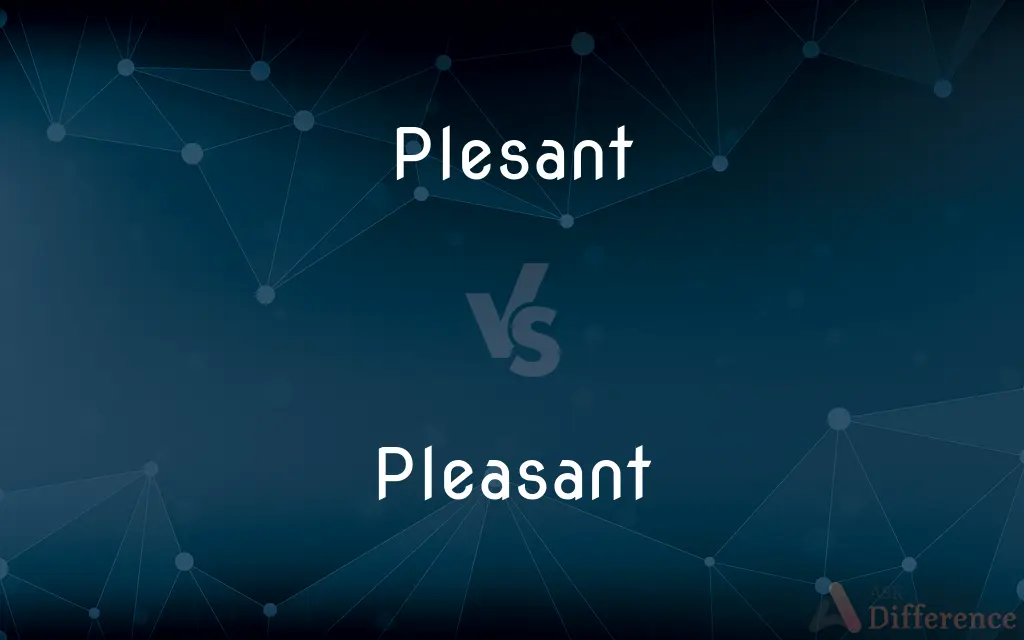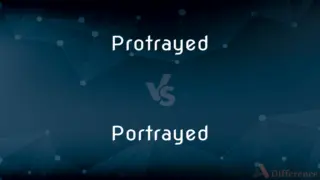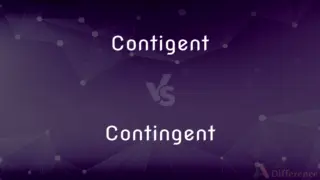Plesant vs. Pleasant — Which is Correct Spelling?
Edited by Tayyaba Rehman — By Fiza Rafique — Updated on March 28, 2024
"Plesant" is incorrect; the correct spelling is "Pleasant," referring to something pleasing, agreeable, or enjoyable.

Table of Contents
Which is correct: Plesant or Pleasant
How to spell Pleasant?

Plesant
Incorrect Spelling

Pleasant
Correct Spelling
ADVERTISEMENT
Key Differences
Remember the correct spelling, "Pleasant," contains an “a” after the “s.”
Practicing the word in sentences like, “We had a pleasant day” helps reinforce the correct spelling.
Visualize a pleasing and agreeable ant to recall "Pleasant."
Associate "Pleasant" with "Pleasure," both have an “a” after the “s.”
Think of “Pleasant” as “Please” + “ant,” combining politeness and agreeability.
ADVERTISEMENT
How Do You Spell Pleasant Correctly?
Incorrect: He found the weather to be very plesant today.
Correct: He found the weather to be very pleasant today.
Incorrect: Their vacation was more plesant than expected.
Correct: Their vacation was more pleasant than expected.
Incorrect: The movie was not very plesant to watch.
Correct: The movie was not very pleasant to watch.
Incorrect: She had a very plesant personality.
Correct: She had a very pleasant personality.
Incorrect: I had a plesant conversation with my teacher.
Correct: I had a pleasant conversation with my teacher.
Pleasant Definitions
Agreeable to the senses, charming.
The pleasant aroma filled the room.
Giving a sense of happy satisfaction or enjoyment.
We had a pleasant conversation over dinner.
Producing feelings of comfort or contentment.
The pleasant weather made our day.
Enjoyable due to being in harmony with one’s surroundings.
It’s pleasant to walk in the park.
Friendly and considerate; likable.
She has a pleasant demeanor.
Giving or affording pleasure or enjoyment; agreeable
A pleasant scene.
Pleasant sensations.
Pleasing in manner, behavior, or appearance.
Fair and comfortable
Pleasant weather.
Merry; lively.
Giving pleasure; pleasing in manner.
We had a pleasant walk around the town.
It wasn't so hot outside, but pleasant enough to have lunch in the garden.
(obsolete) Facetious, joking.
(obsolete) A wit; a humorist; a buffoon.
Pleasing; grateful to the mind or to the senses; agreeable; as, a pleasant journey; pleasant weather.
Behold, how good and pleasant it is for brethren to dwell together in unity!
Cheerful; enlivening; gay; sprightly; humorous; sportive; as, pleasant company; a pleasant fellow.
From grave to light, from pleasant to serve.
A wit; a humorist; a buffoon.
Affording pleasure; being in harmony with your taste or likings;
A pleasant person to be around
We had a pleasant evening together
A pleasant scene
Pleasant sensations
Pleasant in manner or behavior;
I didn`t enjoy it and probably wasn't a pleasant person to be around
Pleasant Meaning in a Sentence
The afternoon was warm and pleasant, perfect for a picnic.
The music added a pleasant background to the evening.
She has a pleasant way of making everyone feel welcome.
Our stay at the hotel was very pleasant.
I had a pleasant dream last night.
It was a pleasant surprise to find an old friend at the party.
They found a pleasant little coffee shop around the corner.
The weather forecast predicts pleasant temperatures for the weekend.
A pleasant scent came from the kitchen, making everyone hungry.
He made a pleasant remark about her new dress.
The teacher's voice was calm and pleasant, making the lesson enjoyable.
The evening breeze was cool and pleasant.
They had a pleasant conversation over dinner.
Our new neighbors are very pleasant to talk to.
The park looks pleasant in the spring with all the flowers blooming.
Making new friends is always a pleasant experience.
The walk by the river was quiet and pleasant.
Her letter was filled with pleasant news about her travels.
A pleasant smile can make someone's day better.
The movie provided a pleasant escape from reality for a few hours.
The book she recommended was a pleasant read.
The city is known for its pleasant climate.
Finding a pleasant shade under the tree, they rested for a while.
The garden party was a pleasant gathering of friends and family.
A pleasant attitude can make difficult situations easier to handle.
Pleasant Idioms & Phrases
Pleasant as punch
Extremely pleased or happy.
She was as pleasant as punch after passing her final exams.
Pleasant to the ear
Sounds that are enjoyable or nice to listen to.
The choir's harmony was very pleasant to the ear.
Make it pleasant
To create a friendly or enjoyable atmosphere.
They always make it pleasant for visitors at their home.
A pleasant change
A welcome difference from what is usual.
The cooler weather was a pleasant change after the long heatwave.
Pleasant dreams
A wish for a good night's sleep filled with nice dreams.
She kissed her children goodnight and wished them pleasant dreams.
In a pleasant mood
Feeling happy and content.
He was in a pleasant mood after getting the promotion.
Have a pleasant ring to it
To sound nice or appealing.
The name of their new shop has a pleasant ring to it.
Pleasant to the eye
Visually appealing.
The art gallery was filled with works that were pleasant to the eye.
Keep it pleasant
To maintain a friendly or agreeable tone.
Even during their debate, they managed to keep it pleasant.
A pleasant surprise
An unexpected but enjoyable experience.
Running into an old friend in town was a pleasant surprise.
Common Curiosities
Which vowel is used before Pleasant?
Either “a” or “e” can be used as in “a pleasant day” or “an equally pleasant evening.”
What is the root word of Pleasant?
The root word is "please."
What is the pronunciation of Pleasant?
It is pronounced as /ˈplɛzənt/.
What is the singular form of Pleasant?
"Pleasant" is an adjective and does not have singular or plural forms.
Which preposition is used with Pleasant?
"Of," as in "the scent of something pleasant."
Is Pleasant an adverb?
No.
What is the verb form of Pleasant?
"Pleasant" is an adjective and doesn’t have a verb form.
Which conjunction is used with Pleasant?
Any conjunction can be used, depending on sentence structure.
Why is it called Pleasant?
It's called "pleasant" because it denotes an agreeable, enjoyable, or likable quality or experience.
Is Pleasant a noun or adjective?
Adjective.
Is Pleasant an abstract noun?
No.
Is Pleasant a countable noun?
No, it’s an adjective.
Is Pleasant a negative or positive word?
Positive.
Is Pleasant a collective noun?
No.
Is the word Pleasant imperative?
No.
Is the word Pleasant a Gerund?
No.
Is Pleasant a vowel or consonant?
"Pleasant" is a word composed of vowels and consonants.
How many syllables are in Pleasant?
Two.
What is a stressed syllable in Pleasant?
The first syllable, "Pleas," is stressed.
What is the opposite of Pleasant?
Unpleasant.
Which article is used with Pleasant?
Both "a" and "the" can be used with "pleasant."
How do we divide Pleasant into syllables?
Pleas-ant.
What part of speech is Pleasant?
Adjective.
Is the Pleasant term a metaphor?
No, but it can be used metaphorically.
What is another term for Pleasant?
Enjoyable.
How is Pleasant used in a sentence?
“It was a pleasant surprise to see her at the party.”
Is the word “Pleasant” a Direct object or an Indirect object?
Neither, as it is an adjective.
Which determiner is used with Pleasant?
"This" or "that."
Share Your Discovery

Previous Comparison
Protrayed vs. Portrayed
Next Comparison
Contigent vs. ContingentAuthor Spotlight
Written by
Fiza RafiqueFiza Rafique is a skilled content writer at AskDifference.com, where she meticulously refines and enhances written pieces. Drawing from her vast editorial expertise, Fiza ensures clarity, accuracy, and precision in every article. Passionate about language, she continually seeks to elevate the quality of content for readers worldwide.
Edited by
Tayyaba RehmanTayyaba Rehman is a distinguished writer, currently serving as a primary contributor to askdifference.com. As a researcher in semantics and etymology, Tayyaba's passion for the complexity of languages and their distinctions has found a perfect home on the platform. Tayyaba delves into the intricacies of language, distinguishing between commonly confused words and phrases, thereby providing clarity for readers worldwide.


































